
-
Starter Pack
![Trumix Complete 7" Studio Monitor Bundle with Stands]() Pre-Order
Pre-Order -
![Black Lion Revolution 2x2 USB-C Audio Interface]() Pre-Order
Pre-Order -
![PreSonus StudioLive AR8c 8-Channel Digital Mixer]() Pre-Order
Pre-Order -
![Focusrite Clarett+ 2Pre Audio Interface]() Pre-Order
Pre-Order -
![Zoom R20 Multi Track Recorder]() Pre-Order
Pre-Order -
![Solid State Logic SSL 12 USB Audio Interface]() Pre-Order
Pre-Order -
![Rode NT1 Complete Studio Recording Kit]() In Stock
In Stock -
![Yamaha AG03MK2 LSPK Live Streaming Pack, Black]() Pre-Order
Pre-Order -
Starter Pack
![Trumix Complete 5" Studio Monitor Bundle with Stands]() Pre-Order
Pre-Order -
![Steinberg UR44C USB 3 Audio Interface]() Pre-Order
Pre-Order -
![Cameo DVC 512-Channel USB to DMX Interface and Control Software Package]() Pre-Order
Pre-Order -
![Allen & Heath ZEDi-10FX Hybrid Compact Mixer]() Pre-Order
Pre-Order -
![Mackie Mainstream Streaming Interface]() Pre-Order
Pre-Order -
![Presonus Audiobox 96 Studio Ultimate - 25th Anniversary Edition]() Pre-Order
Pre-Order -
![Motu Micro Book 2 USB Audio Interface]() Pre-Order
Pre-Order -
![Yamaha ZG01 Game Streaming Audio Mixer]() Pre-Order
Pre-Order -
![Steinberg UR22MKII Recording Pack Elements Edition]() Pre-Order
Pre-Order -
![Apogee Groove USB DAC]() Pre-Order
Pre-Order -
B-Stock
![B-Stock Focusrite Scarlett 4i4 Recording Interface 4th Generation]() Pre-Order
Pre-Order -
![PreSonus IOSTATION 24C Audio Control Surface]() Pre-Order
Pre-Order -
![Line 6 POD Studio UX2 USB Audio Interface]() Pre-Order
Pre-Order -
![Lewitt CONNECT 6 USB-C Audio Interface]() Pre-Order
Pre-Order -
![Zoom UAC-232 USB Audio Interface]() Pre-Order
Pre-Order -
![Apogee Jam X Guitar Interface]() Pre-Order
Pre-Order
Popular Brands
USB Audio Interfaces
USB Audio Interfaces are the most popular interfaces, perfect for PC and laptop users, as most will already have an available, free USB port. USB Audio Interfaces can be cheaper than the other types of audio interfaces too while offering incredible versatility, connectivity, and the ability to record anywhere you like with a laptop or PC. We stock a huge range of USB audio interfaces from the worlds leading brands such as the Universal Audio Apollo and Universal Audio Arrow interfaces, Focusrite Scarlett and Focusrite Clarett audio interfaces as well as the likes of the Arturia AudioFuse USB audio interfaces which all offer exceptional value for money, extremely professional sound quality and of course USB connectivity. Call into your local PMT store to speak to our studio and production experts about your ideal USB audio interface – we can help you get the sound you need based on your budget, bespoke recording needs, and your set-up.
Firewire Interfaces
Firewire interfaces work differently than USB - they stream data and are faster, which means lower latency. But most computers don't have Firewire ports, which mean you may need to upgrade your hardware before buying a Firewire interface.
Thunderbolt Interfaces
These are the best and most professional interfaces - ultra-fast, allowing for quick data transfer and much lower latency than any USB or Firewire interface. They are also much more expensive, so not the best choice for someone just setting up a project studio - but ideal for pro recording environments.
Mobile, Tablet, IOS Interfaces
If you plan to record directly to your iPad or iPhone, for instance, then these are the best options, allowing for portable and affordable recording.
PCI Interfaces
This is the old standard and not as popular, as involves having to install a new PCI card on your PC. Some might come with analogue inputs, but often not - you'll need a breakout box, as well as preamps for your mics etc. Not the most practical choice then, but some people still prefer them due to the faster transfer speed allowed by the PCI technology.
Choosing The Best Audio Interface For Your Needs
When choosing your audio interface, you will need to give consideration to many different things including the required number of inputs and outputs, mic preamps, and features such as MIDI in and out. With such a wide selection available, choosing the right one can prove difficult, and understanding what features and specs you need can be a daunting prospect. But at the PMT music tech shops, our product experts are on hand to take the confusion out of this situation and, by working with you, they will help to determine the correct audio interface for you!
Audio Interface FAQs
-
Why do I need an audio interface?
An audio interface allows you to record and use audio that is of a high-quality for music production or podcasting. Most soundcards do not feature a soundcard capable of handling the audio necessary for recording music.
-
What audio interface is best for beginners?
Some good beginner audio interfaces are manufactured by Focusrite, PreSonus, and M-Audio.
-
Can I use an audio interface as a sound card?
Yes, an audio interface will act as an external soundcard when it is connected to a computer.
-
How do I connect an audio interface to my speakers?
Connect the outputs of your interface to the monitors. The most commonly used cables are 1/4 inch TRS to TRS and TRS to XLR. The signal is at line level.
-
What is the difference between usb, thunderbolt and firewire audio interfaces?
These are different types of connectivity. Check which is used on your computer or laptop before buying an interface.
-
Do I need a preamp with an audio interface?
Some interfaces already have a built-in pre-amp. They are not necessary but can allow for more flexibility when recording.






























